main content Shifting Gears
After a remarkable 51-year career in politics, Rep. Earl Blumenauer BA ’70, JD ’76 prepares to retire, leaving behind a sprawling legacy reflecting his commitment to livable communities, transportation, the environment, cannabis legalization, animal rights, health care, and more.
By Erika Bolstad
Photographs by John Valls
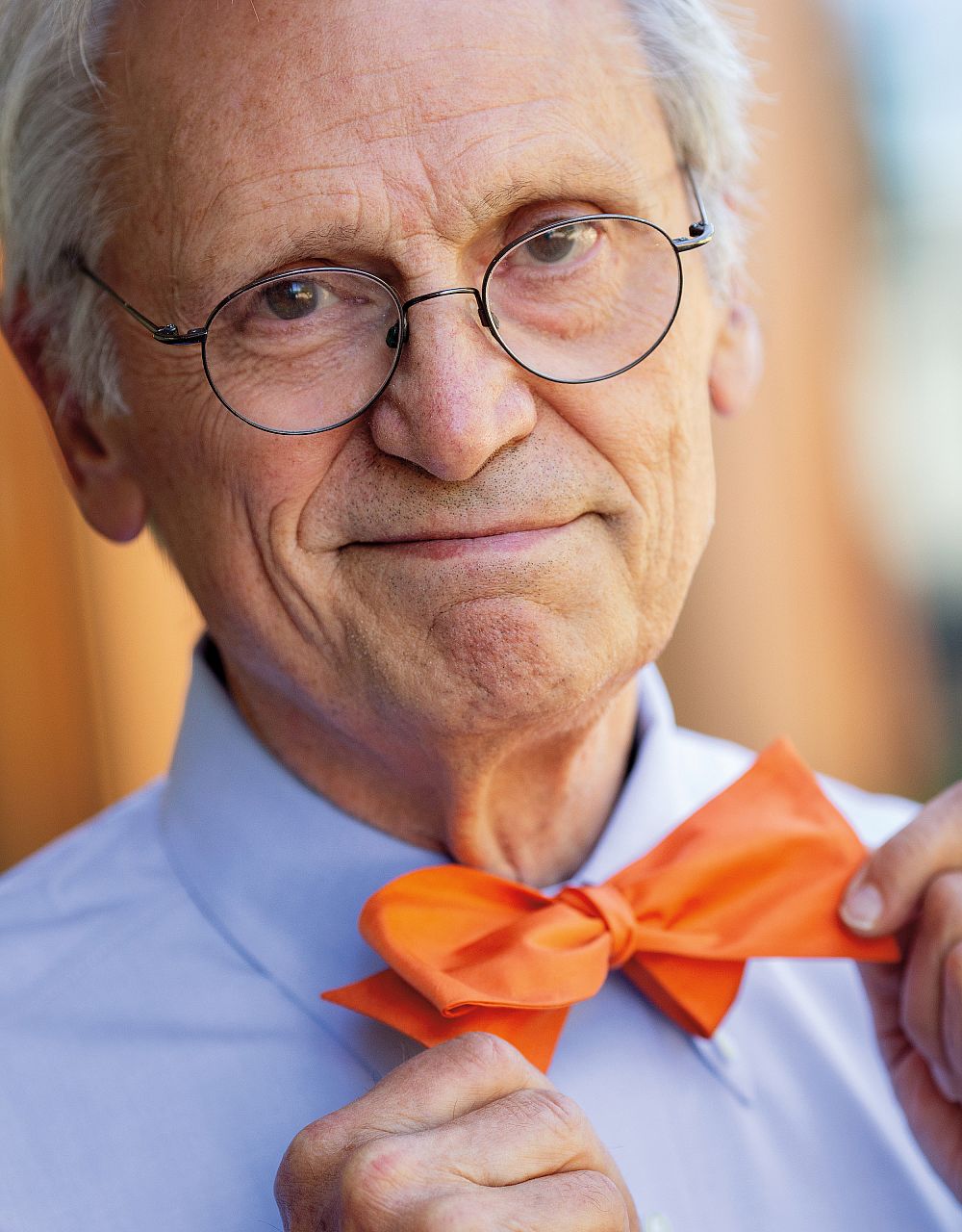
The first time Earl Blumenauer BA ’70, JD ’76 testified in front of Congress, he was a 21-year-old college senior a few months away from a degree in political science from Lewis & Clark. It was 1970, and Blumenauer was in Washington, D.C., to urge a U.S. Senate committee to support the passage of a constitutional amendment lowering the voting age nationwide from 21 to 18. Back home in Oregon, Blumenauer was leading a campaign known as “Go 19,” which sought to establish 19 as the threshold for casting a ballot in the state.
The Oregonian described the future congressman as an “anti-hippie,” who presented as “clean shaven, neatly dressed, bright, and articulate” in front of the committee. The article suggested that Blumenauer’s appearance, poise, and eloquence were in stark contrast to other young activists at the time.
As he drove 40,000 miles around Oregon campaigning for the statewide initiative, Blumenauer heard from fellow young people, many of whom expressed a sense of futility. American society was in the midst of a major upheaval, led in part by idealistic activists on college campuses nationwide. Although young men were being drafted to serve in the Vietnam War at 18, they couldn’t vote until 21 and lacked a voice in the decisions that led to their deployment.
Blumenauer’s academic advisor, Don Balmer, a renowned political science professor at the time, gave him permission to devote his senior year to working on the campaign. “I showed up on campus to take final examinations when I had to for various classes, but I basically was gone for the entire academic year, traveling the state,” Blumenauer says.
But it was at Lewis & Clark where Blumenauer’s future career path took shape. A former high school debater, he was drawn to Lewis & Clark, in part, by the reputation of its debate team. While in L&C’s library, prepping for competitions, he also read through endless transcripts of Senate committee hearings to better understand the Vietnam War. It was both eye-opening and sobering to see how the federal government failed to tell the American people the truth about the war, Blumenauer says.
Ultimately, the Go 19 campaign failed in Oregon, collapsing after campus protests roiled American cities in the spring of 1970, including in Portland. Blumenauer told newspaper reporters that “bitterness is my gut reaction,” a melodramatic response perhaps befitting his age and limited exposure to defeat. But the campaign and the loss shaped Blumenauer. He was already a strong debater; with the Go 19 campaign, he learned how to speak to the press and how to build a broad bipartisan coalition behind issues. And while Lewis & Clark was foundational to his political education, Blumenauer’s time on the campaign trail also proved a critical on-the-job education in political organizing and policy development, both of which would prove prescient for his time in Congress. “I made relationships that continue to this day,” he says. “This is how I started my career, being involved with politics, debate, and campus activities that defined the rest of my life.”
-
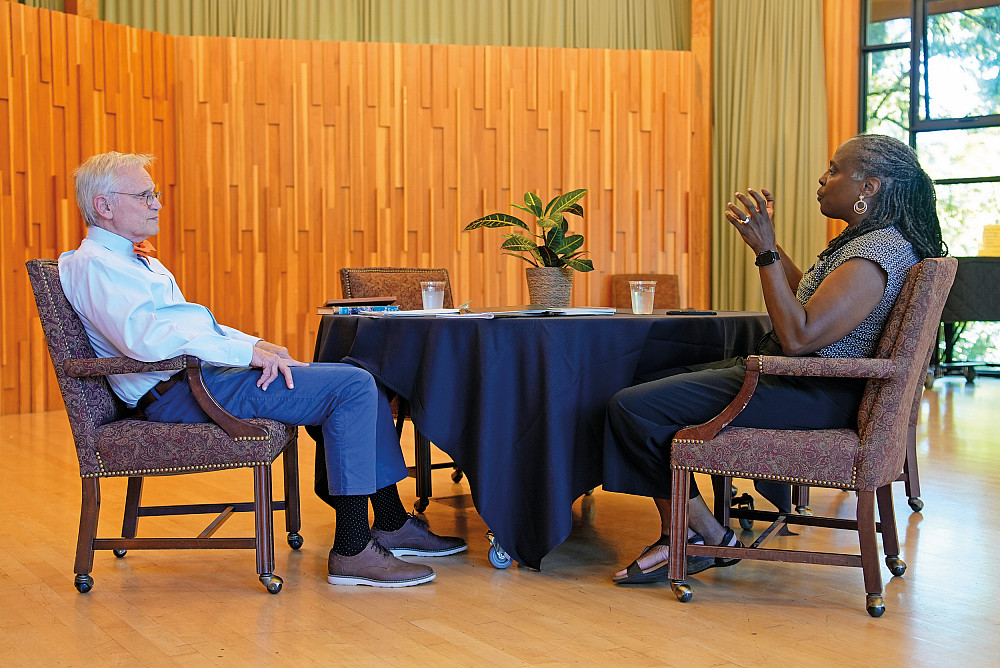 Blumenauer meets with President Robin Holmes-Sullivan on the Lewis & Clark campus in summer 2024.Credit: Stephen Mercier
Blumenauer meets with President Robin Holmes-Sullivan on the Lewis & Clark campus in summer 2024.Credit: Stephen Mercier -
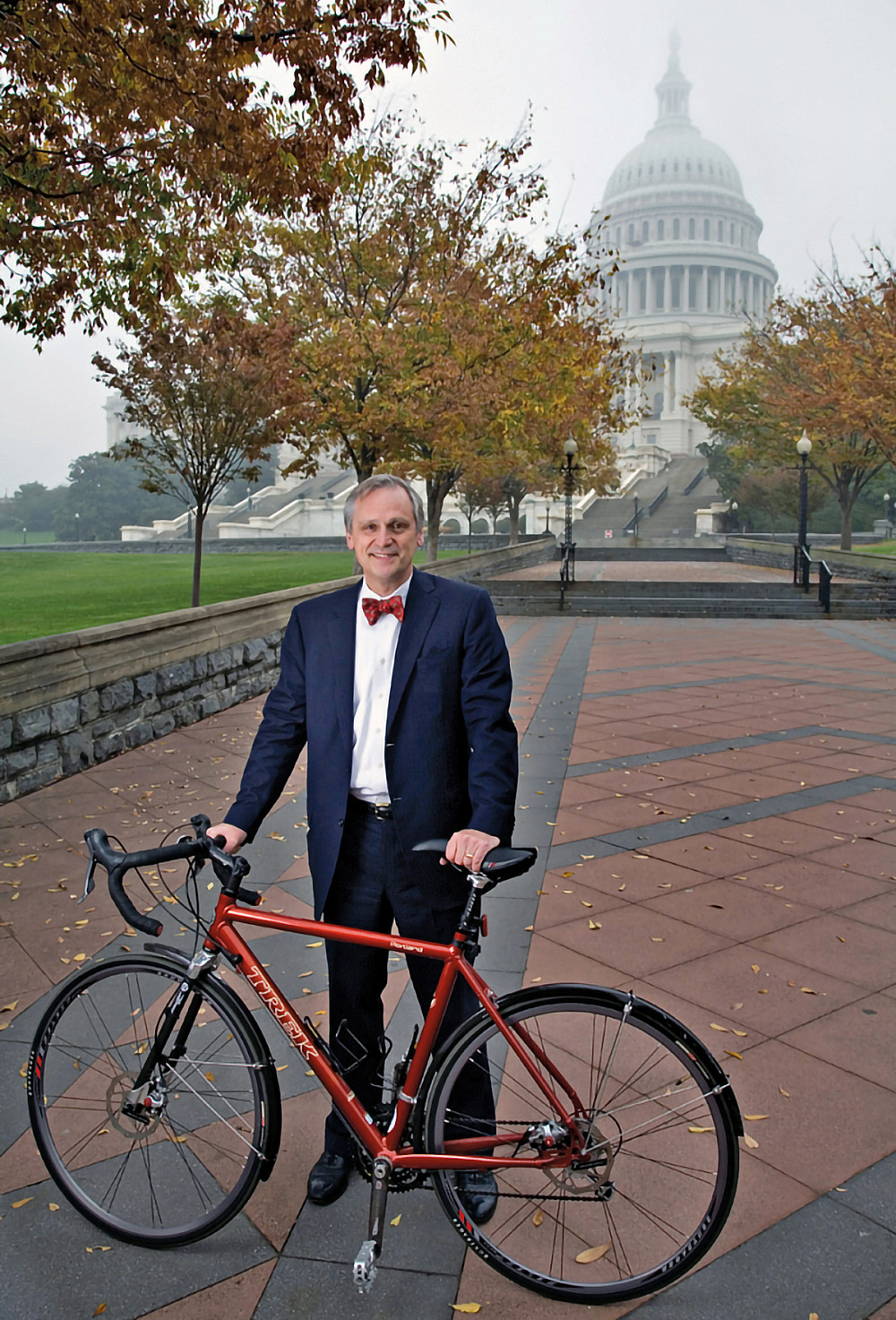 Rep. Earl BlumenauerCredit: Historical photos courtesy of the Office of Rep. Earl Blumenauer.
Rep. Earl BlumenauerCredit: Historical photos courtesy of the Office of Rep. Earl Blumenauer. -
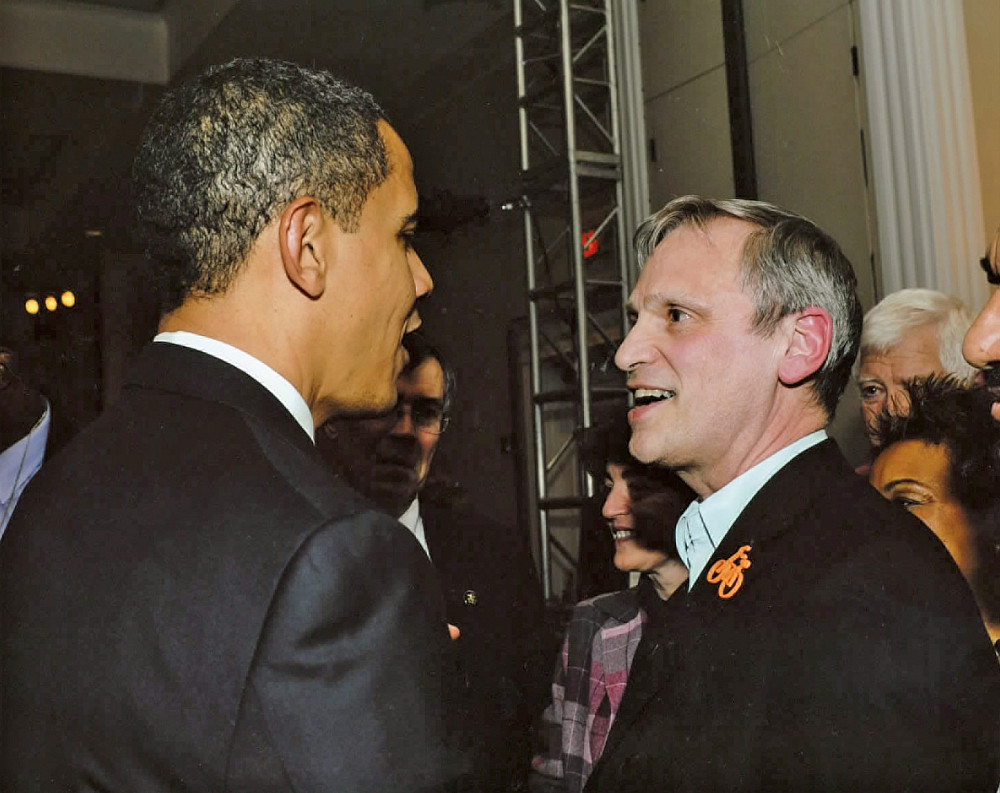 Rep. Earl Blumenauer with Barack Obama, then-candidate for president, at a campaign stop in Portland, Oregon, in 2008. Blumenauer was one of the first members of Congress to endorse Obama for president.Credit: Historical photos courtesy of the Office of Rep. Earl Blumenauer.
Rep. Earl Blumenauer with Barack Obama, then-candidate for president, at a campaign stop in Portland, Oregon, in 2008. Blumenauer was one of the first members of Congress to endorse Obama for president.Credit: Historical photos courtesy of the Office of Rep. Earl Blumenauer. -
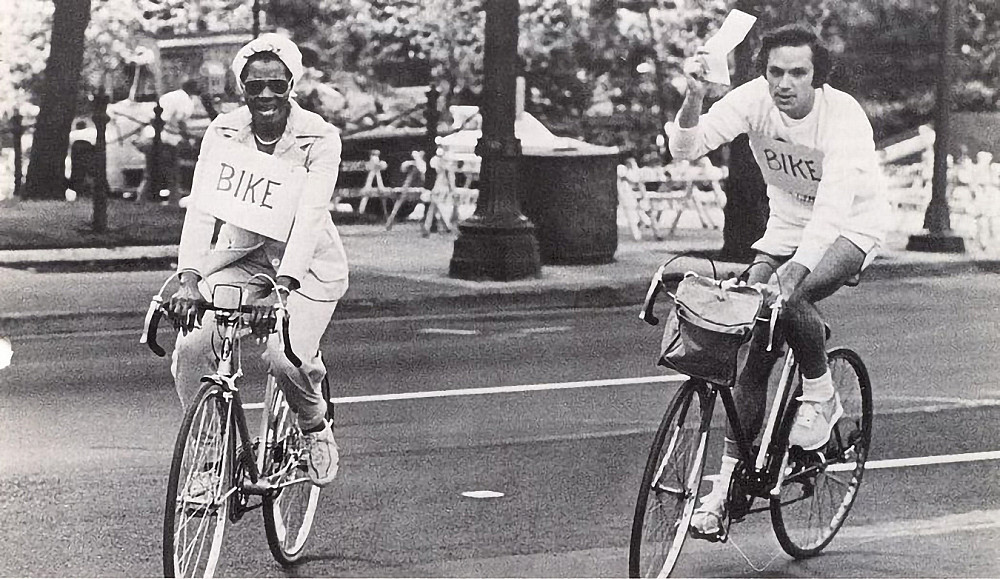 Multnomah County Commissioner Gladys McCoy and Blumenauer in 1979, taking part in a multimodal race in downtown Portland. Biking proved more efficient than walking, bus riding, and driving.Credit: Historical photos courtesy of the Office of Rep. Earl Blumenauer.
Multnomah County Commissioner Gladys McCoy and Blumenauer in 1979, taking part in a multimodal race in downtown Portland. Biking proved more efficient than walking, bus riding, and driving.Credit: Historical photos courtesy of the Office of Rep. Earl Blumenauer. -
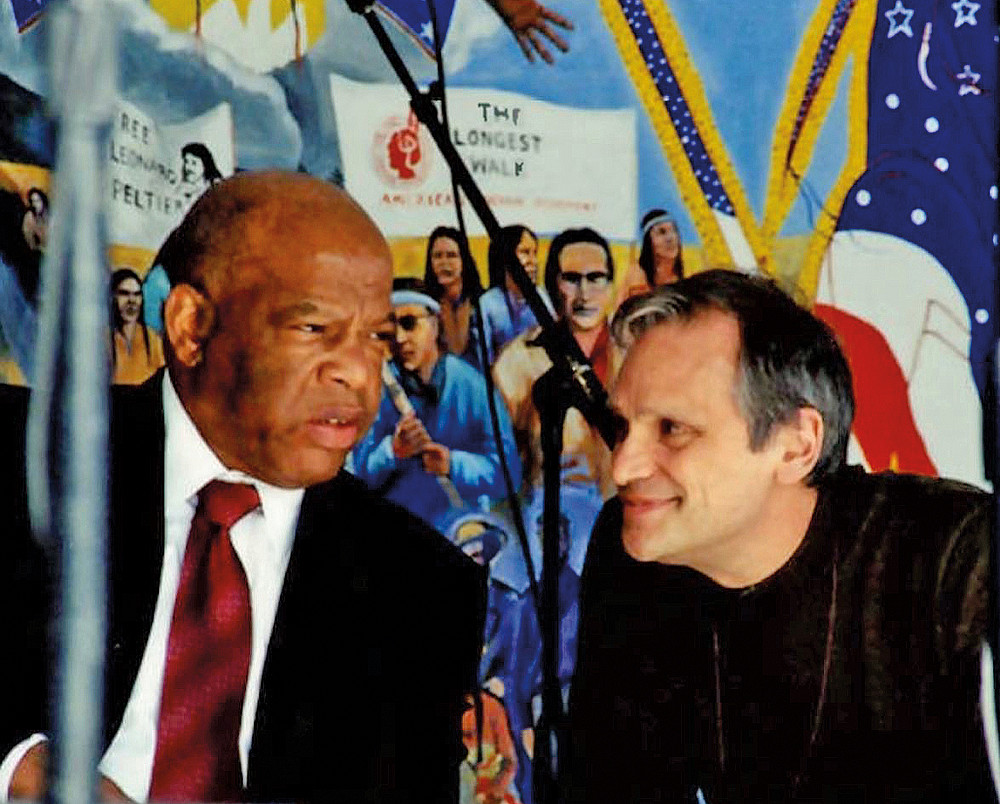 John Lewis with Blumenauer in 2006. The two served together in Congress for nearly a quarter century.Credit: Historical photos courtesy of the Office of Rep. Earl Blumenauer.
John Lewis with Blumenauer in 2006. The two served together in Congress for nearly a quarter century.Credit: Historical photos courtesy of the Office of Rep. Earl Blumenauer. -
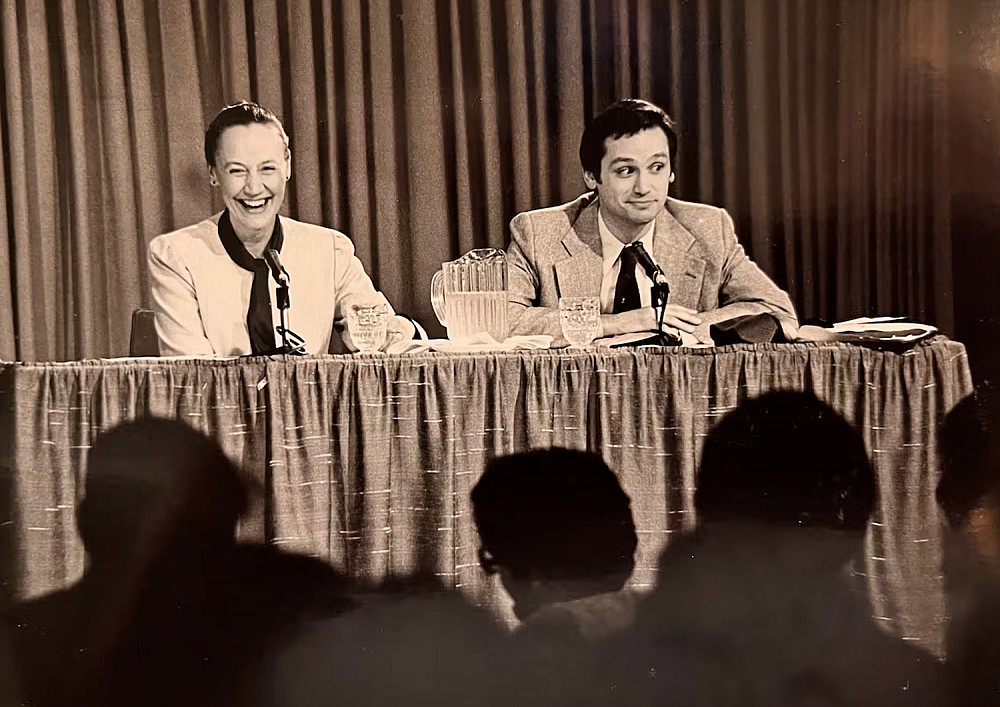 Margaret Strachan and Blumenauer in a Portland City Council debate in 1981.Credit: Historical photos courtesy of the Office of Rep. Earl Blumenauer.
Margaret Strachan and Blumenauer in a Portland City Council debate in 1981.Credit: Historical photos courtesy of the Office of Rep. Earl Blumenauer. -
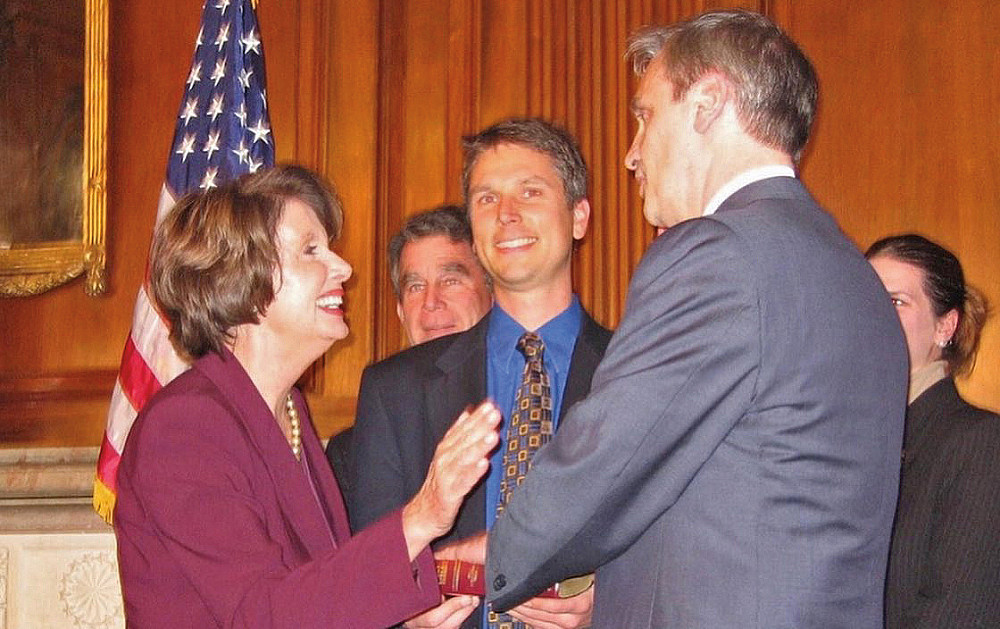 Nancy Pelosi with Blumenauer and his son, Jon, at the swearing-in ceremony for lawmakers of the 110th Congress in 2007. Pelosi had just made history as the first woman elected to serve as Speaker of the House.Credit: Historical photos courtesy of the Office of Rep. Earl Blumenauer.
Nancy Pelosi with Blumenauer and his son, Jon, at the swearing-in ceremony for lawmakers of the 110th Congress in 2007. Pelosi had just made history as the first woman elected to serve as Speaker of the House.Credit: Historical photos courtesy of the Office of Rep. Earl Blumenauer.
Historical photos courtesy of the Office of Rep. Earl Blumenauer. L&C photo by Stephen Mercier.
Perhaps most importantly, Blumenauer learned that there’s “always a next step.” He went on to work on the nationwide campaign to pass the 26th Amendment, lowering the voting age to 18, which sailed through ratification in 38 states, including Oregon, and took effect July 1, 1971.
“We went from losing the state election, which would have had an impact on only a small part of the country, to working on an amendment to the U.S. Constitution, with ramifications for the entire U.S.,” he says. “So it was kind of a seamless transition to a bigger, more exciting, and ultimately successful effort.”
Now 76 and about to retire from Congress, Blumenauer has built a 51-year career in public service, with a focus on seemingly incremental policy changes that add up to big impacts aimed at making communities more livable. Over his career in local, state, and federal office, he’s made transportation, the environment, cannabis legalization, animal rights, health care, and food policy his priorities.
Blumenauer’s start as an elected official came in 1972, when lawmakers who came to know him from the constitutional amendment campaign encouraged him to run for a new legislative district, Oregon’s 3rd, in his southeast Portland neighborhood. At age 24, Blumenauer was elected to the Oregon House of Representatives, drawing on the coalition he had built during the Go 19 campaign.
He served at a time when the Oregon legislature was dominated by youth and eager to embrace a spirit of reform. The agenda included landmark land-use legislation and transportation policy as well as early efforts to decriminalize cannabis possession, setting the stage for legalization of marijuana for medical and recreational use.
“It was an exciting time in Oregon politics,” he says. “It was pretty heady stuff for a kid.”
His life got even fuller, quickly. Blumenauer had a full-time job working in the president’s office at Portland State University, a young family at home, and a burgeoning political career in the state legislature. After his first term as a state lawmaker, he decided to return to Lewis & Clark to earn a law degree. He reasoned that if he was going to draft and pass legislation, he should understand the law.
“I realized everybody I was talking to was either a lawyer or they were employed by lawyers,” he says. “I didn’t have a career path plotted, but it was a logical step to equip me to be able to do the job. I had no intention of ever practicing law, but I wanted to be able to understand the law.”
My job is to get up in the morning and see if there are any little steps we can do to make the world better.”
In 1978, he was elected as a Multnomah County commissioner. Eight years later, he moved on to Portland City Council, where he was commissioner of public works and managed the city’s transportation, land-use planning, and environmental services. He lost a 1992 campaign for Portland mayor against Vera Katz. Then in 1996, Blumenauer was elected to Congress to fill the seat formerly held by U.S. Sen. Ron Wyden.
“What I’ve done for a living is a gift,” Blumenauer said. “My job is to get up in the morning and see if there are any little steps we can do to make the world better. And it’s a great feeling.”
Blumenauer arrived in Washington, D.C., in the prime of his life and at the top of his local political career. In the Beltway, though, he was an unknown Democrat from a liberal city in a mostly liberal state, serving at the beginning of what would turn out to be a decade-long Republican House majority. Blumenauer sought out ways to distinguish himself, becoming known for his signature bow ties as well as his colorful bicycle lapel pins. Another memorable differentiator?
His holiday fruitcake gifts to congressional colleagues and friends.
“It was a time of great conflict and bitterness,” he says, not unlike the present-day partisanship on display in Congress. Yet Blumenauer has worked throughout his career to find policy-driven solutions that transcend party allegiance. “Part of what I tried to do was stake out some territory where I could do things that could help bring people together,” he says.
As a new congressman, he worked to find common ground by founding the bipartisan Congressional Bike Caucus. Blumenauer, who often describes bicycles as “the most efficient form of transportation ever devised,” believed the Bike Caucus could help advance his policy goals; it would demonstrate how Portland could be a national laboratory for livability, a priority since his time as a city leader.
He put his mettle to the pedal in Washington by riding to work on Capitol Hill—and even riding a bicycle to his first White House meeting in 1996. In his first decade in the House, Blumenauer served on the House Transportation and Infrastructure Committee, where he advocated for projects such as streetcars and bicycle lanes in Portland and beyond. He also pushed for Washington, D.C., to evolve into a bike-friendly city. “I’m intensely proud of bike lanes in the middle of Pennsylvania Avenue,” he says.
Part of what I tried to do was stake out some territory where I could do things that could help bring people together.”
The Bike Caucus, and the bipartisan Cannabis Caucus he also helped start, were creative ways of finding commonalities, a priority since his days stumping for the Go 19 campaign. Blumenauer throughout his career advocated for legalizing cannabis on the federal level and coauthored a legislative blueprint to legalize, tax, and regulate cannabis.
Blumenauer was never a regular on cable television, preferring a policy-driven approach to make his mark, taking advantage of the committee process, appropriations, and his relatively safe seat in a blue district. His first press conference on Capitol Hill was about civility, held jointly with Rep. Ray LaHood, a Republican from Illinois who worked with Blumenauer on the transportation committee and who went on to serve as transportation secretary in the Obama administration.
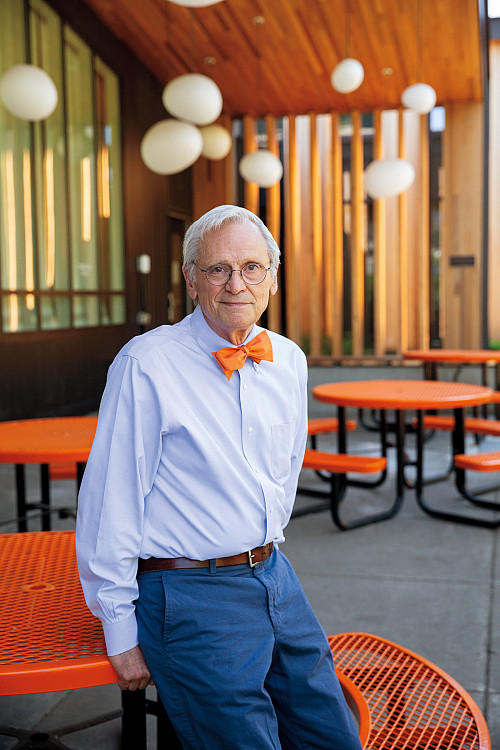
Ever the problem solver from his days running a City of Portland bureau, Blumenauer took the same no-nonsense approach to his career in Congress. After a few years on the Hill, he realized that new members weren’t prepared for some of the logistical demands of running a congressional office. He wrote a three-page memo explaining the job to new members of Congress. (It has ballooned to seven pages over the years.) Blumenauer hand-delivered the memo to each new representative, regardless of their party, ensuring that they met him personally and that he transmitted valuable institutional knowledge. As he exits Congress, he has turned over the duty to Don Beyer, a Democrat from Virginia and a former ambassador to Switzerland in the Obama administration.
“These are little things,” he says, “but if we all do little things, we’ll make a difference.”
After more than 50 years in elected office, his lesson to the young people who will follow in his footsteps is as straightforward as Blumenauer: “The most important thing is to be a good citizen.”
How does he define good citizenship?
“Bring people together. Do simple things. Work cooperatively. And any of us can do these things,” he says. “We don’t have to be an elected official. Being a citizen is the most important job. And I think some of the people in political office have forgotten their role as citizens. How do they make their community better? How do they bring people together? And that to me is the lesson and the challenge.”
In retirement, Blumenauer plans to continue exercising good citizenship, but closer to home. Blumenauer served on Gov. Tina Kotek’s Central City Task Force aimed at reinvigorating downtown Portland. “It’s one of the reasons why I’m leaving Congress to come back,” he says. “I want to be able to work on things here in Portland.”
After years of weekly flights between Portland and D.C., he has also promised his wife, Margaret Kirkpatrick JD ’82, that they will devote more time to “family, friends, fitness, and fun.”
In 2022, the City of Portland named a bicycle and pedestrian bridge for Blumenauer. The $19 million bridge, which spans Interstate 84 at Seventh Avenue in Northeast Portland, was the equivalent of a lifetime achievement award for the longtime transit advocate. Blumenauer biked to the bridge’s official opening on a hot August day. He beamed with satisfaction, citing the bridge as evidence that “how we put the pieces together matters,” especially as the city faces challenges in the years ahead. And he gestured toward his grandchildren, who accompanied him to the event. “What we’re doing here today is celebrating their future,” he said.
Today, when asked what it was like to be in his home city of Portland on a bike on the day the bridge was named for him, the eloquent former high school and college debate champ struggles to formulate an answer. He holds back his emotions before offering a clipped, three-word response. It’s a reply that may well sum up his career as a public servant: “It was sweet.”
Of the People, For the People
During his more than 27-year career in Congress, Congressman Earl Blumenauer has been at the forefront of every major issue of our time. His many accomplishments include:
- Leading the Ways and Means Committee to craft provisions included in the single largest measure to combat the climate crisis in American history: the Inflation Reduction Act.
- Securing more than $1.5 trillion in the Bipartisan Infrastructure Law, the largest investment in rebuilding and renewing America in history. This included historic amounts of funding for active transportation: a 70 percent increase in bike and pedestrian funding and the creation of a $1 billion Safe Streets and Roads for All program.
- Saving more than 100,000 restaurants during the COVID-19 pandemic by creating the $28.6 billion Restaurant Revitalization Fund.
- Expanding health care coverage for more than 500,000 Oregonians through the Affordable Care Act, including a new Medicare benefit for end-of-life care planning.
- As a local elected official and member of Congress, Blumenauer was responsible for the development of Portland’s innovative transit system, including the light rail and streetcar system. This includes building out Portland’s bike network, making Portland internationally recognized as one of the nation’s most livable cities.
Blumenauer also:
- Became Congress’ leading champion in ending the failed war on drugs. He founded the Congressional Cannabis Caucus as a forum to educate members of Congress about federal cannabis policy initiatives, authored the legislative blueprint for federal legalization, and has campaigned in every successful state legalization effort.
- Created a national bike movement shaping communities large and small. He is recognized as one of the top 25 change makers in cycling history. He founded the Congressional Bike Caucus to bring members of Congress together to practice bike partisanship.
- Became recognized as an environmental champion for protecting resources across America. In Oregon, his legislation protected 127,000 acres of wilderness and 80 miles of Wild and Scenic Rivers in the Mount Hood National Forest and Columbia River Gorge, preserving these special places for generations to come.
- Authored the Senator Paul Simon Water for the World Act, the most comprehensive piece of international water policy to date affecting the lives of hundreds of millions of people.
- Championed major legislation to stop imports of illegally harvested timber from around the world into the United States.
- Created the Small Starts program to help streetcar projects across the country receive federal funding and technical assistance. This program has led to more than 22 streetcar projects around the country so far, including three in Portland.
Source: Office of Rep. Earl Blumenauer, October 30, 2024.
More L&C Magazine Stories
L&C Magazine is located in McAfee on the Undergraduate Campus.
MSC: 19
email magazine@lclark.edu
voice 503-768-7970
fax 503-768-7969
The L&C Magazine staff welcomes letters and emails from readers about topics covered in the magazine. Correspondence must include your name and location and may be edited.
L&C Magazine
Lewis & Clark
615 S. Palatine Hill Road
Portland OR 97219

